Arm Total Compute Solutions 2022: Supercharging visual experiences for next-generation devices
This blog introduces the second-generation Arm Total Compute Solutions, including the latest upgrades and additions to a broad range of solutions for all consumer device markets.
By Kinjal Dave
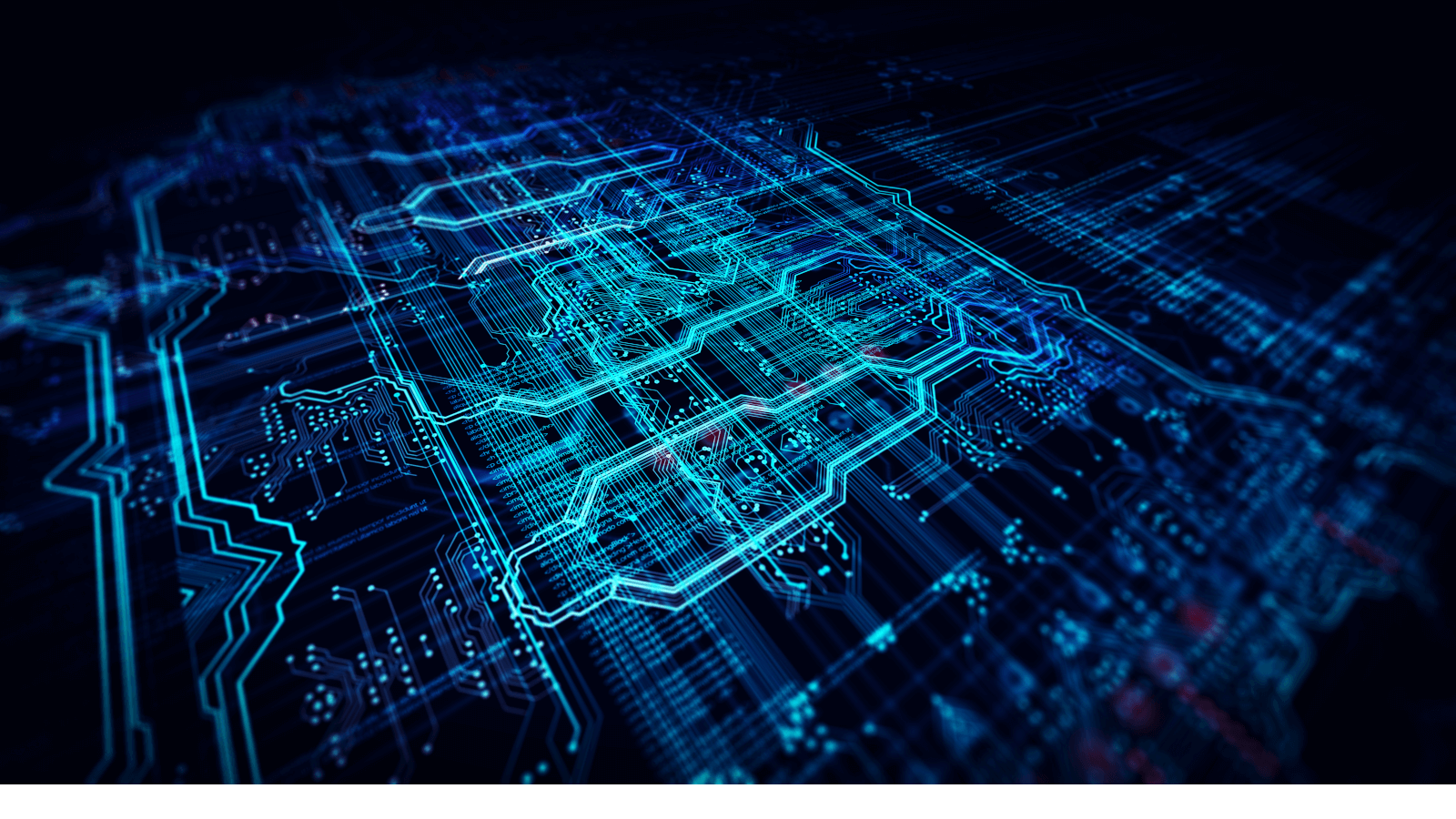
In 2021, we introduced our first ever Total Compute Solutions for all consumer device markets across different performance and efficiency tiers. Now, we are delighted to launch the second-generation Total Compute Solutions (TCS22), as Arm continues the drive toward market and use-case focused solutions for next-generation devices.
With an emphasis on the three key Total Compute pillars of compute performance, security, and developer access, TCS22 adopts a holistic system approach to drive the workloads of tomorrow. TCS22 also leverages the influence and scale of the Arm software developer ecosystem to optimize visual experiences.
Brand new solutions
As with the first generation, TCS22 addresses all consumer device markets, offering different levels of performance, efficiency, and scalability for specialized compute processing.
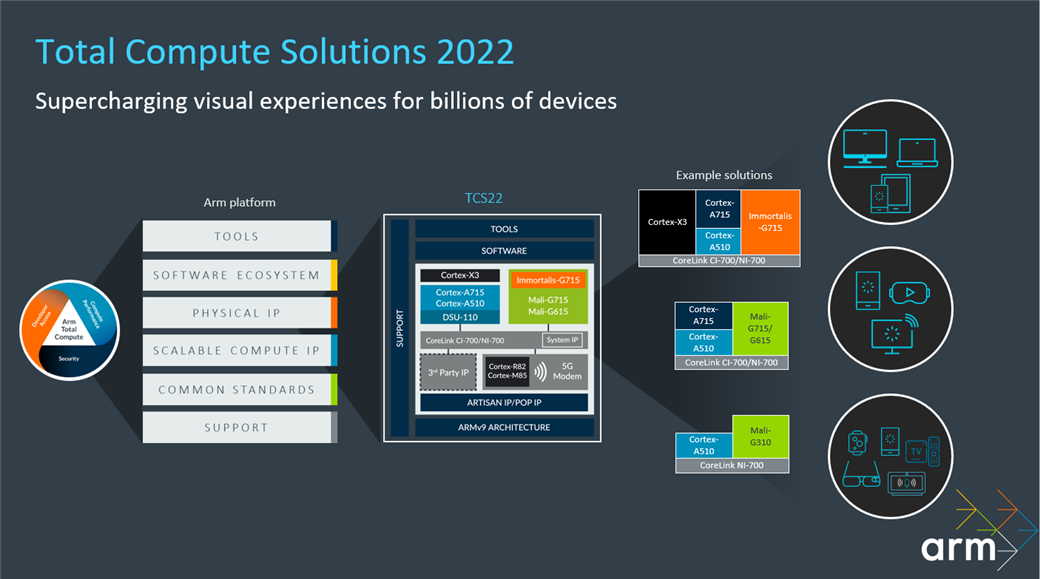
The premium solutions deliver industry-leading performance across flagship and premium smartphone, laptop, and desktop PC devices.
The performance solutions offer a wide range of performance, efficiency, and scalability points across multiple segments. These include mid-range smartphones, Chromebooks, virtual reality (VR) headsets, and premium DTVs and set-top boxes.
Finally, the efficiency solutions offer industry-leading efficiency across entry-level smartphones, lightweight XR wearables such as augmented reality (AR) smartglasses, and mid-range and entry level DTVs and set-top boxes.
Providing the backbone for these new solutions is Arm’s hardware IP (including the second-generation Armv9 CPUs, new GPUs (including the new flagship Immortalis-G715), System IP and Interconnect technologies, and Cortex-M CPU processors), physical IP, software, tools, and standards.
Upgrades and additions
Building on the first-generation, TCS22 offers new upgrades and additions to enhance system performance across the SoC. These focus on the following areas:
- New IP and upgrades
- Advanced gaming experiences
- Machine learning (ML) acceleration
- Enhancing platform security
- Software and tools, including the latest full Android software stack support for developers.
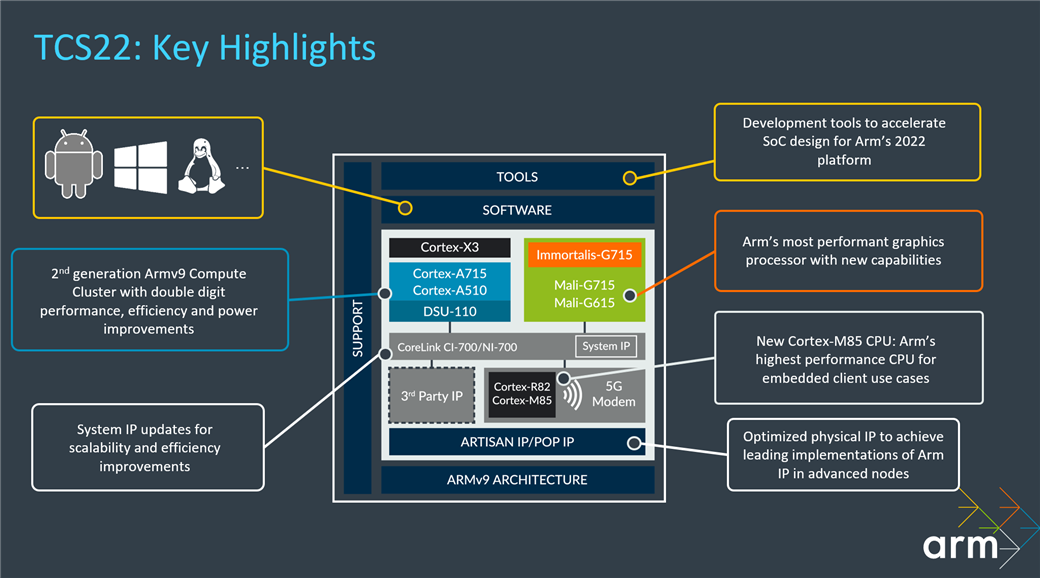
New IP and upgrades across the solutions
First, there are new CPUs and GPUs, with Arm launching the new Arm Cortex-X3 CPU, Arm Cortex-A715 CPU, Arm Mali-G715 GPU, Arm Mali-G615 GPU and the first Arm flagship GPU Immortalis-G715.
The new second-generation Armv9 CPUs deliver double-digit performance, efficiency, and power improvements. They can be utilized as part of different “big.LITTLE” CPU cluster configurations that are scalable up to 12 cores across different solutions.
The new GPUs are Arm’s most performant graphics processors to date, with new capabilities and features for enhanced visual experiences. Immortalis-G715 brings gaming performance to a whole new level and is the first Arm GPU to offer hardware-based Ray Tracing support for more realistic gaming experiences.
Elsewhere, we have made the following IP updates and additions to TCS22:
- Improving scalability and efficiency through System IP updates
- Physical IP to enable best-in-class implementations of TCS22 in advanced process nodes (5nm and 4nm)
- The recently launched Arm Cortex-M85 CPU, Arm’s highest performing CPU for embedded use cases on consumer devices, and also adding custom instruction support for the Arm Cortex-M55 CPU
- MMU support on the Arm Cortex-R82 CPU.
Advanced gaming experiences
Arm recognizes the power of gaming in today’s mobile market. Gaming continues to drive smartphone platforms, with gaming applications now accounting for 43 percent of all smartphone use. Moreover, there are now 2.2 billion active mobile gaming users, with 78 percent of them on Android.
TCS22 meets the demand for more complex AAA gaming experiences on mobile. In addition to the new Armv9 CPUs, Immortalis-G715 with hardware-based Ray Tracing support, and new premium Mali GPUs with new graphics features, we have also made further optimizations to the Mali-DDK. This reduces the CPU load and improved system level cache utilization with fine grained cache allocation policies for enhanced performance, and reduced memory bandwidth and solution power consumption.
These new additions and improvements provide a bandwidth reduction of 23 percent, power reduction of 16 percent and performance uplift of 28 percent across multiple gaming contents. These were measured on an Arm internal TCS22 reference design implemented on an FPGA platform. Essentially, this delivers immersive gaming experiences on mobile for longer.
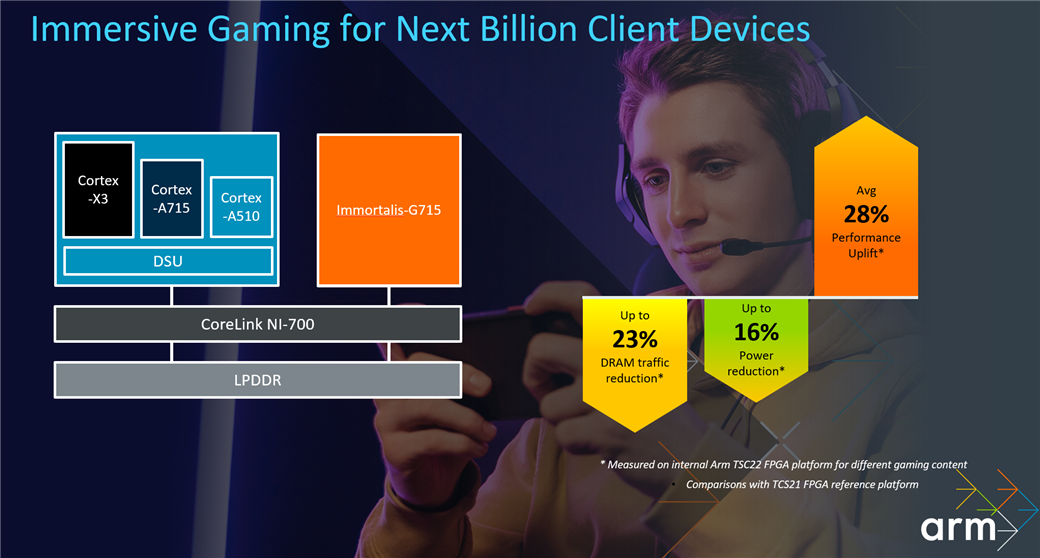
ML acceleration
ML workloads are redefining the user experience across all consumer devices. Currently, there are several key use cases that all vary in performance needs:
- Integrated sensor hubs for audio sensing and vibration detection require lower performance.
- Voice assistants for speech interactions, as well as voice recognition and keyword detection.
- AI camera and video require the most performance. These use cases utilize a whole range of technologies, including computer vision, image recognition, deep learning and ML, to enrich visual experiences.
TCS22 unleashes ML compute for high-performance AI camera and video use cases. This leads to performance uplifts in:
- Object detection (43 percent increase).
- Super resolution (32 percent increase).
- Object classification (30 percent increase).
- Real-time recognition (39 percent increase).
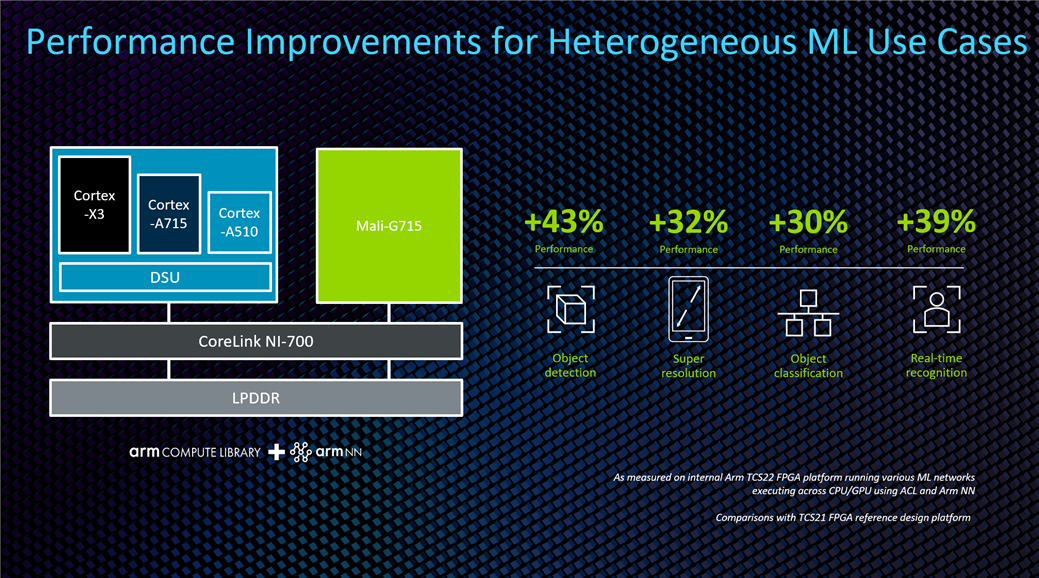
Furthermore, TCS22 has doubled ML capabilities with a range of new features and optimizations. These include:
- Matrix Multiply instruction support added to the new GPUs, enabling 2x architectural ML improvements.
- The addition of Cortex-M85 with Helium and Cortex-M55, enabling the efficient execution of DSP and ML algorithms in small power budgets..
- Optimizations across Arm Compute Library (ACL).
- System-level optimizations, like fine-tuning caches and reducing latency to DRAM.
- Integrating Arm NN and ACL into Android. This makes ML more accessible to third-party developers to unlock ML performance across millions of applications and billions of devices.
Security
Security across TCS22 has been enhanced with three key layers:
- In-process security
- Secure firmware update
- Trusted Execution Environment (TEE)
In-process security has been strengthened with the introduction of the new asymmetric Memory Tagging Extension (MTE) through our second-generation Armv9 CPUs. This significantly enhances MTE performance through offering greater flexibility between the speed and precision of targeting security vulnerabilities. MTE, with the new asymmetric MTE option, allows both in-field security monitoring, as well as in-house debugging, to ease and speed up software development.
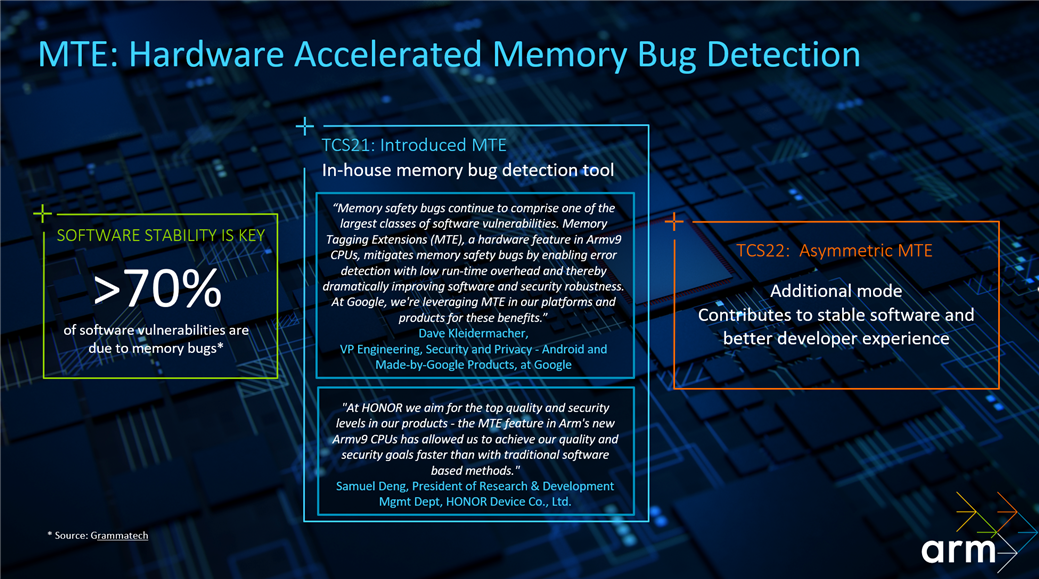
MTE was introduced in 2021 for the first time as part of our first-generation Armv9 CPUs, making it easier and more efficient to detect memory safety violations. This saves time and costs for everyone across the entire device value chain, including silicon vendors, device manufacturers, operating system vendors (OSVs) and developers.
Elsewhere for in-process security, we have enhanced PAN, which secures user data against JITed code attacks. We have also adopted Pointer Authentication (PAC) and Branch Target Identifier (BTI) in tiny area footprints with our Cortex-M family of processors. Cortex-M85 is the first Cortex-M processor to optionally support PAC and BTI. The expansion of PAC and BTI expands the security capabilities of Cortex-M processors to mitigate against Return Orientated Programming and Jump Orientated Programming attacks that are targeted to complex software stacks.
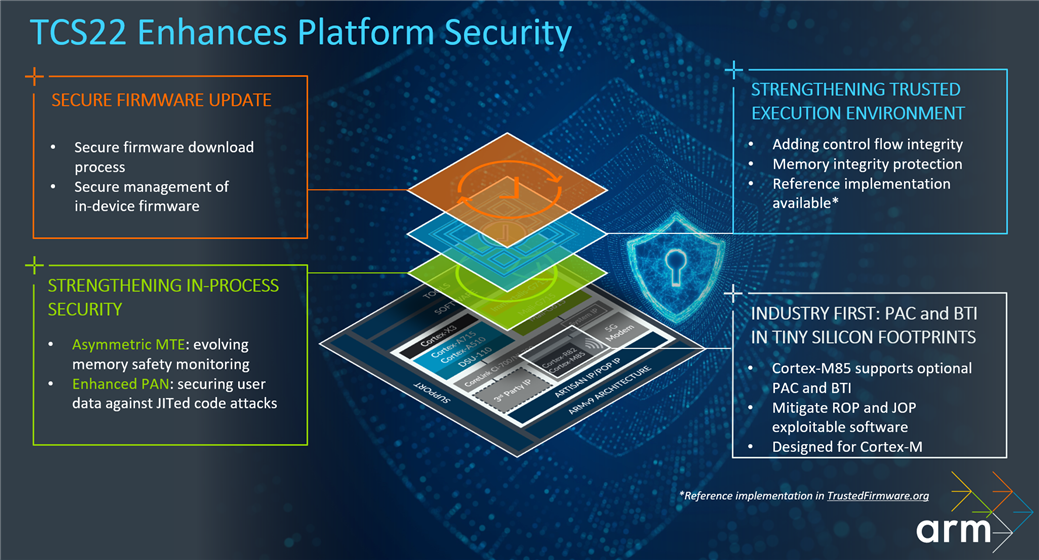
Software and tools
With TCS22, we are providing the latest Android AOSP requester software stack, which includes the latest features available for developers. All of the information on the software stack can be found here, including Arm’s Fixed Virtual Platform (FVP), against which the stack is run and validated. This enables developers to rapidly deploy and then customize their own solutions.
On top of the new software stack, Arm Hardware and Software Success kits provide developers with unlimited access to Arm’s tools and models. The Hardware Success Kit accelerates time-to-market for silicon vendors from design to silicon tape out. Meanwhile, the Software Success Kit enables developers to build, debug, and analyze the full software stack before deployment.
Solutions for All Consumer Device Markets
TCS22 accelerates performance across key complex workloads and use cases with a holistic platform approach. Continuous improvements across the different IP in the new solutions deliver best-in class gaming and advanced ML experiences on Arm-based devices. Meanwhile, we remain committed to delivering enhanced security capabilities across the entire value chain, from the silicon vendor designing SoCs to developers honing their applications. All of this has been optimized through new software features that help ensure the smoothest developer experience.
This combination of performance, compute, security, and software in TCS22 delivers the ultimate user experience across a broad range of consumer segments, from laptop and mobile to home and XR wearable devices. This is driving the next decade of consumer devices and a future that will be built on Arm.
By Kinjal Dave
Re-use is only permitted for informational and non-commerical or personal use only.
